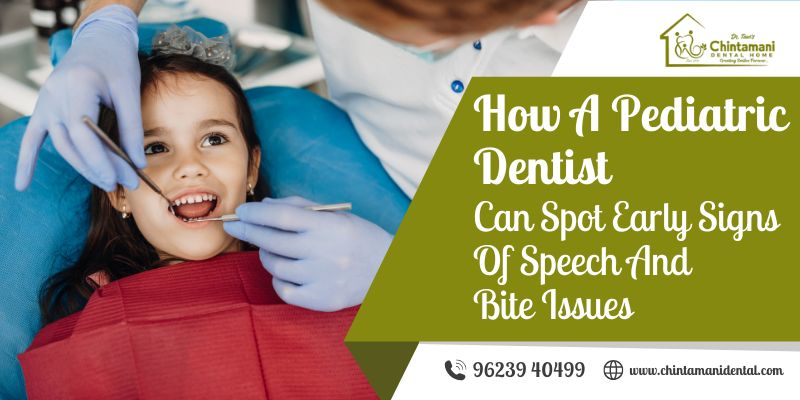How a Pediatric Dentist Can Spot Early Signs of Speech and Bite Issues

What Exactly Are Speech and Bite Issues?
Before diving in, let’s clear up what we mean by speech and bite issues.
Speech issues involve problems with articulation (like pronouncing certain sounds), fluency (such as stuttering), or voice (like pitch and volume). These problems can sometimes be caused by how the mouth is formed or functions.
Bite issues, also known as malocclusions, are related to how the upper and lower teeth align. Common examples include overbites, underbites, crossbites, and open bites.
Both types of issues can affect a child’s confidence, eating habits, and overall development. That’s why spotting them early is so important, and that’s where a pediatric dentist comes in.
What Pediatric Dentists Look For
At a regular dental checkup, a pediatric dentist does way more than just count teeth. They’re checking for the alignment of teeth and jaws, tongue positioning, and even how a child breathes. Here are a few things they keep an eye on:
- Tooth Alignment
Crooked or overcrowded teeth can be an early sign that a child might struggle with proper articulation. Some sounds, like "s" or "th," require specific tongue and teeth placement. If the alignment is off, speech can be affected. - Jaw Development
The dentist will observe how the upper and lower jaws come together. A misaligned jaw can lead to bite issues, which might also influence how a child speaks. For instance, an open bite (where the front teeth don’t touch when the mouth is closed) can make it hard to form certain sounds. - Tongue and Lip Function
The way a child uses their tongue and lips during speech or while eating can be very telling. Pediatric dentists often check for conditions like tongue-tie (where the tongue is restricted by a tight band of tissue) that can impact both feeding and talking. - Mouth Breathing
Chronic mouth breathing isn’t just a habit—it can indicate nasal blockages or jaw development issues. It can also affect speech patterns and even the shape of a child’s face over time.
How These Issues Affect Daily Life
Speech and bite problems aren’t just clinical; they impact real-life and everyday things for kids. Imagine being a child and struggling to pronounce your own name or chew your food properly. These challenges can make school, social situations, and mealtimes frustrating.
Kids with unaddressed bite issues might avoid certain foods or develop digestive problems from poor chewing. Those with speech difficulties may also become self-conscious or withdrawn in classroom settings. Catching these issues early makes a huge difference.
Teaming Up with Other Experts
One of the great things about pediatric dentists is that they don’t work in a bubble. When they notice something off, they’ll often collaborate with other specialists like speech-language pathologists or orthodontists. That way, your child gets comprehensive care that addresses every issue.
For instance, if a dentist notices a tongue-tie, they may refer your child for a frenectomy (a small surgical procedure) and then work with a speech therapist to improve articulation afterward. It’s a team effort to help your child thrive.
Why Early Detection Matters
The earlier a speech or bite issue is spotted, the easier it is to treat. Children’s bones and muscles are still developing, so they’re more adaptable to change. That means early interventions, whether it’s braces, a minor surgical procedure, or speech therapy, can be more effective and less invasive.
Also, getting ahead of these problems can save you time and money down the road. A small misalignment fixed early could prevent the need for more intensive orthodontic treatment later.
Routine Visits Make All the Difference
It’s easy to think, “My kid’s teeth look fine,” and skip regular dental visits. But those twice-a-year checkups are about more than cavities—they’re a chance for a professional to keep tabs on your child’s total oral development.
Pediatric dentists have the training and the keen eye to notice things that might fly under the radar. Whether it’s a subtle speech delay or a slight jaw misalignment, early observation can lead to early solutions.
A pediatric dentist does much more than polish teeth. They are looking at the big picture. Their job includes ensuring your child’s mouth is developing properly, which can have a huge impact on speech and bite function.
So the next time you’re in the dental chair with your little one, remember: you’re not just investing in a cavity-free smile—you’re helping to lay the foundation for clear speech, healthy eating, and growing confidence.
Looking for expert care for your child’s teeth and development?
Book a consultation with Chintamani Dental Clinic, a trusted pediatric dentist in Karad, to ensure your little one’s smile is healthy, happy, and future-ready!
